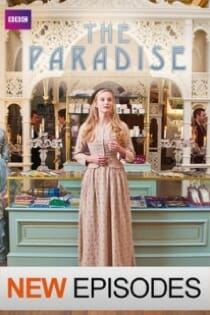There are glimmering moments in Paradise, the directorial debut from Juno writer Diablo Cody, when it seems something special may materialize beneath the chintzy neon lights of Las Vegas. But Cody’s fresh coming-of-age story keeps pulling back from blossoming into something a bit magical. As a writer, Cody has ditched Juno’s cheeky pop references and precociousness for something more mature—and that’s a good thing—but all the promising parts don’t end up becoming a fully grown-up movie.
At its simplest, and to its credit, Paradise is sweet. It’s the story of Lamb, a girl from a Montana town so conservative it makes the place in Footloose look like a non-stop rave. The fresh-faced young lady (a determined Julianne Hough) survives a plane crash that leaves her body not-so-fresh, receives a fortune in a legal settlement, denounces God in front of her entire church, and skips out of town to find the real world in Las Vegas. Where, at age 21, she walks around with the naiveté of a 14-year-old.
When she hits the town, she encounters two bartender pals with their own life issues and skewered views of the world. Taking little Lamb under their wing, William (Russell Brand) and Loray (Octavia Spencer) show her the two sides of Vegas, the tourist trap and the locals’ letdown. After umpteen Sin City films, it’s a pleasure to see something that’s neither a party nor a depressing dirge. In Cody’s eyes, Vegas is a strange amalgam of people just trying to get by and have a little fun. Kind of like every other city in the world, except with excessive hotel glitz and more hookers.
Within that universe of faux dreams, Lamb simply can’t find her way; the fact that she might reach an epiphany within 24 hours has potential, that Cody might create a poetic metaphor about the little journeys in life, wrapped up in an unrealistic place and period of time. The actors hold up their end of the bargain and save a couple scenes each—Spencer plays Loray with a firm, even keel, and Brand pushes his boyish charm without overcranking it. But anytime Paradise heads toward originality, something obvious or expected whips the genre format back into shape.
It’s clear, for example, that Lamb only imagines existing in one of two polar worlds, the overly sacred or the brazenly sinful. Yet, Cody finds the need to stuff that fact into the dialogue and have William observe it out loud. Doing so demeans the audience and eliminates any underlying elegance.
Unfortunately, that’s not an isolated incident. If you’re thinking it, a character in Paradise is too often saying it. And as kind and embraceable as Hough seems to be, her final-act voiceover sounds like teen-movie cheese. It’s as if this enjoyable film is regressing just as its protagonist is transforming into a real, self-aware adult.
As for those moments where Paradise seems like something special, here’s a favorite: Lamb giddily rides a zip-line down Fremont Street, a fuzz of Vegas lights behind her, the camera tracking along with her as Rachel Portman’s lovely, child-like score accompanies the shot. It’s a unique visual that brings a smile to your face. The feeling and the creativity, however, are fleeting.
Director: Diablo Cody
Writer: Diablo Cody
Starring: Julianne Hough, Russell Brand, Octavia Spencer, Nick Offerman, Holly Hunter, Kathleen Rose Perkins
Release Date: Oct. 18, 2013
